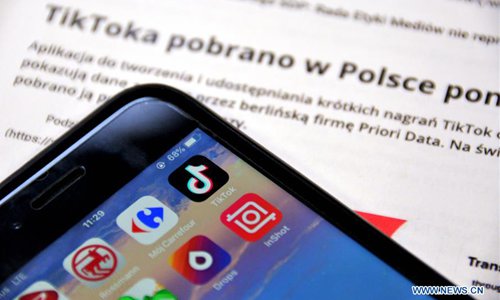Decimating Chinese apps displays US weakness: official
By Zhang Hongpei Source: Global Times Published: 2020/7/13 20:28:40

Photo taken on Feb. 13, 2019 shows the Tiktok app icon (upper right corner) on a smartphone screen. (Xinhua/Shi Zhongyu)
A possible US crackdown on Chinese social media apps just showed the US' weakness, which is not in line with the values the country claims it holds, a Chinese official said on Monday.
In a regular briefing, Hua Chunying, spokesperson for China's Foreign Ministry, said "the US prides itself on strong values ... then why it is so afraid of a social media app that can easily share entertainment video clips, which has been proved to be very popular among US teenagers."
The US has constantly sought fault with short-video platform TikTok, which is owned by Beijing-based start-up ByteDance.
White House adviser Peter Navarro said he expects US President Donald Trump to take "strong action" against Chinese-run social media apps TikTok and WeChat for engaging in an alleged "information warfare" against the US, according to Bloomberg News. Even if TikTok is sold to an American buyer, it would not solve the problem, Navarro said.
Neither ByteDance nor Tencent responded to the Global Times' inquiries for a comment as of press time.
It is not the first time US hawks have threatened Chinese software firms citing US national security.
The US is "looking at" banning TikTok and other Chinese social media apps, US Secretary of State Mike Pompeo said last week.
Gao Lingyun, an expert at the Chinese Academy of Social Sciences in Beijing, told the Global Times on Monday that it seems the US government's strategy is to put TikTok into a frame that it sets up in order to restrict and contain Chinese high-technology companies, just like it has been bullying Huawei in the name of its national security.
"Nationalism is rising in the US, and by cracking down on Chinese technology firms, the White House wants to win more votes," said Gao.
Data showed that TikTok is very popular among US teenager users. As of January 2020, teens accounted for 37.2 percent of TikTok's active user accounts in the US. According to App Ape, users aged 20 to 29 years were the second-largest user group, accounting for 26.3 percent.
"Why would a strong US suddenly become so vulnerable? I think it is a question worth our consideration," Hua said, hoping that US officials could conduct dialogue with young people in the US and stop doing things that make them laugh.
Despite ByteDance's repeated statements about its data security and efforts to make its overseas products and operations as localized as possible, the US government has chosen to ignore those moves.
TikTok is reportedly contemplating shifting its headquarters out of China, according to some media reports.
If the US ban is enforced, it will have a major impact on the company, as the US is one of its most important overseas markets for TikTok, but the impact might be temporary, analysts said.
Shun Yu, an independent internet observer, told the Global Times on Monday that "the US' ploy in attacking Chinese firms ... indicates that it has exhausted its cards to play."
Posted in: INDUSTRIES,COMPANIES,BIZ FOCUS